Political Economy

How can we build a future with better health and homes, respecting people and the environment? The 2020 edition of the Socialist Register, Beyond Market Dystopia, contains a wealth of incisive essays that entice readers to do just that: to wake up to the cynical, implicitly market-driven concept of human society we have come to accept as everyday reality. Intellectuals and activists such as Michelle Chin, Nancy Fraser, Arun Gupta, and Jeremy Brecher connect with and go beyond classical socialist themes, to combine an analysis of how we are living now with visions and plans for new strategic, programmatic, manifesto-oriented alternative ways of living. Crafted with purposeful hope in an age of despair, each essay in this volume aims to create a world of agency and justice. | more…
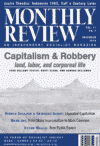
Bloomberg insists that we need to get our priorities straight: the economy comes before the earth, capitalism before nature. Yet, from any sort of realistic, world-wise perspective, it is clear that we are faced with two immense, imminent, and irreversible crises, one threatening within as short a time as a year to destabilize the world capitalist economy, the other promising to destroy the planet as a home to humanity, destabilizing industrial civilization and undermining the survival chances of hundreds of millions or even billions of people this century. Both represent the culmination of capitalist contradictions over centuries of development and both point to the need to transform society in revolutionary ways. It is the coevolution of economic and ecological contradictions under global monopoly-finance capital that defines the epochal historical crisis of our times. In this new issue of Monthly Review, we also celebrate Monthly Review‘s relationship with the annual School of Ecology in Mauritius. | more…

An interview with Henryk Szlajfer by Grzegorz Konat. Szlajfer was a leading figure in the student uprisings in Poland in March 1968. He was expelled from the University of Warsaw and was arrested and imprisoned for political dissent. He later conducted research in political economy focusing on the theory of monopoly capitalism, where he made major contributions, and coedited The Faltering Economy with John Bellamy Foster. | more…

Free Public Transit: And Why We Don’t Pay to Ride Elevators, edited by Judith Dellheim and Jason Prince, gives readers a distinctive blend of the visionary and the practical. It surprises us with rarely publicized instances in which quite sweeping societal transformations have been carried out. The matter-of-fact narratives, covering a wide span of national settings, allow us to envision new angles from which to confront some of the key issues of our time, from employment to civility to the rescue of the natural environment. | more…
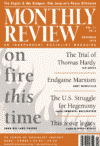
Immanuel Wallerstein, the celebrated world-systems theorist and longtime contributor to Monthly Review and Monthly Review Press, died on August 31, 2019. Wallerstein first achieved international fame with the publication in 1974 of his The Modern World-System: Capitalist Agriculture and the Origins of the World-Economy in the Sixteenth Century (the first in a four-volume masterwork on the Modern World-System. We pay tribute to Wallerstein in this new issue of Monthly Review. | more…

Marge Piercy is the author of many books of poetry, most recently Made in Detroit. | more…
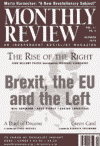
New issue of Monthly Review! If there is one thing that is clear about the economic situation in the mature capitalist economies, as we write these notes in mid-August 2019, it is that the financial world is increasingly running scared and looking for safe havens, worrying about the storm clouds ahead. There is now little doubt that the world economy is on the verge of a recession after a long sluggish recovery from the Great Financial Crisis of 2007-09. In itself this should not give occasion to surprise. In this instance, however, there lurks a bigger fear, the possibility of a financial Armageddon on the level of the Great Financial Crisis of 2008—or worse. | more…

Costas Lapavitsas’s The Left Case Against the EU (Polity, 2019) is recognized as the leading work advocating Lexit, the left-wing case for Brexit, and for nations leaving the European Union more generally. In light of current Conservative British Prime Minister Boris Johnson’s commitment to exit the European Union by October 31, even if it means a no-deal Brexit, the role of the left takes on growing importance. Moreover, this raises issues of the European Union generally, including the dominance of neoliberalism within it and the question of German hegemony. Here, Neil Davidson offers an assessment of Lapavitsas’s book. | more…

In this continuation of the exchange on the European Union, the United Kingdom, and the left, Andy Storey engages with Costas Lapavitsas’s arguments in The Left Case Against the EU. | more…

A Socialist Stance Toward the European Union
As part of the exchange on the European Union, the United Kingdom, and the left, Costas Lapavitsas provides an extensive response to Neil Davidson’s and Andy Storey’s contributions. | more…
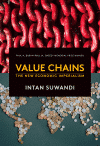
Winner of the 2018 Paul M. Sweezy – Paul A. Baran Memorial Award for original work regarding the political economy of imperialism, Intan Suwandi’s Value Chains examines the exploitation of labor in the Global South. Focusing on the issue of labor within global value chains—vast networks of people, tools, and activities needed to deliver goods and services to the market and controlled by multinationals—Suwandi offers a deft empirical analysis of unit labor costs that is closely related to Marx’s own theory of exploitation. | more…
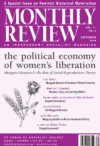
This special issue of Monthly Review honors the fiftieth anniversary this month of Margaret Benston’s landmark “The Political Economy of Women’s Liberation.” The essay sparked a revolution in Marxian thought, the full implications of which are only now being perceived in contemporary social reproduction theory. We have reprinted Benson’s pieces together with contributions by Silvia Federici, Martha E. Gimenez, Selma James (interviewed by Ron Augustin), Leith Mullings, Marge Piercy, and Lise Vogel, all of whom have played leading roles since the 1970s in the development of feminist historical materialism. | more…











